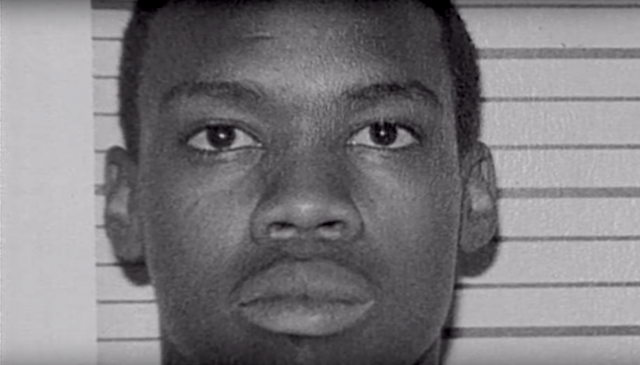

Julius Jones, an Oklahoma man currently on death row for the 1999 murder of Paul Howell, expanded the national attention his case has received after filing a clemency application Oct. 15.
Jones, 39, has been on death row for 20 years and claims innocence in his clemency application (embedded below), writing that certain facts were not made available to the court or jury during his trial.
“I have spent the past 20 years on death row for a crime I did not commit, did not witness, and was not at,” Jones wrote in the application. “I feel terrible for Mr. Howell and his family, but I was not responsible.”
In the application, Jones tells his story, which he says he didn’t get to do during his trial. Jones alleges that a former friend, Chris Jordan, was the only person who committed the murder. Jordan pleaded guilty to first-degree murder in exchange for testifying against Jones, according to the application.
Jordan was given a life sentence with possibility of parole after 30 years. However, Jones said there was a “secret deal” with Jordan and that the prosecution agreed he would serve fewer than 30 years “in exchange for pointing the finger” at Jones.
“Before my trial, [Jordan] and the persecutors in my case agreed that he would only serve 12 to 15 years in prison in exchange for his testimony against me,” Jones said in the application. “That deal was never disclosed to me or the jury.”
Jordan was released from prison in December 2014 after only serving 15 years.
Jones said in the application how he has heard that Jordan had admitted to some that Jones wasn’t involved in the murder.
“In late August or early September 1999, Chris told a man named Manuel Littlejohn that ‘Julius didn’t do it’ and ‘Julius wasn’t there,'” Jones said in the application. “Chris admitted to Manuel that he tried to frame me by wrapping the gun used to commit the crime in a bandana and hiding it in my house.”
Jones said he told his attorney about the confession, but his lawyer never asked Jordan about it or called Littlejohn to testify.
Toward the end of his clemency application, Jones asserted that his series of unanswered questions may be in the case files of the Oklahoma County District Attorney’s Office.
“Why did Chris only serve 15 years in prison even though he was supposed to serve at least 30 years under his plea agreement? Why did prosecutors tell my jury that Chris was going to serve 30 years in prison for what he’d done, when they knew that he’d been promised that he’d get out in half that time?” Jones asks in the application. “The answers to these questions may be in the District Attorney’s files.”
Jones further wrote that his lawyers have asked for Prater to allow them to review the prosecution’s files.
“My lawyers have, for several years now, asked Oklahoma City (sic) District Attorney David Prater to allow them to review the prosecution’s file on my case,” Jones said in his clemency application. “Although Mr. Prater finally agreed, in the fall of 2018, to allow my lawyers to review the state’s file, he ultimately reneged on that promise. Can you ask the district attorney to make his file available to my lawyers and to the public?”
Prater on Monday called those statements inaccurate.
“Everything they are saying now has been disproved or already addressed by appellate courts,” Prater said. “His advocates and lawyers are some of the most dishonest people I have dealt with in my professional career.”
NAACP chapter notes ‘growing statewide and national support’
The Oklahoma State Conference of the National Association for the Advancement of Colored People sent a letter Monday to Oklahoma Gov. Kevin Stitt and the Oklahoma Pardon and Parole Board calling for them to grant Jones’ clemency request.
“Mr. Jones has maintained his innocence for almost 20 years and faces a death sentence,” the letter said. “This letter joins growing statewide and national support of Julius Darius Jones, whose case involves issues including racial bias and an ineffective legal counsel.”
The letter states that Oklahoma has a history of wrongful convictions, exoneration, mass incarcerations, and racially charged accusations, calling it a “national disgrace.”
“In order to correct the wrongs of the past and move forward as a more ethical state,
cases such as Julius Jones must be seriously reconsidered,” the NAACP letter said. “Julius Jones’ story highlights the longstanding racial discrimination that has permeated the criminal justice system in America and more specifically, Oklahoma.”
Light shined by public figures
Jones’ case first gained national attention last year in a seven-episode docu-series produced by actor Viola Davis called The Last Defense.
Last week, businesswoman and supermodel Kim Kardashian West used Twitter to call on Stitt and the Oklahoma Pardon and Parole Board to give “careful and thoughtful consideration” for his application the day after Jones’ clemency application was filed.
Yesterday Oklahoma death-row prisoner #JuliusJones asked the Pardon & Parole Board for clemency. Please help by asking the Board and @GovStitt to give careful and thoughtful consideration to his petition. @justice4julius Learn more at https://t.co/Q5IzUCghZu
— Kim Kardashian West (@KimKardashian) October 16, 2019
After Kardashian West’s tweet gained traction, Pardon and Parole board member Adam Luck sent out a 13-tweet thread walking through the legal differences between application for commutation and an application for clemency.
Julius Jones’ case is receiving national attention this week because he has applied for a commutation as a final legal recourse before execution. I will walk through what I know as a board member, although I do not speak on behalf of the board or the governor. 1/13 https://t.co/w0WvOEjCLH
— Adam Luck (@AdmLuck) October 17, 2019
Read Jones’ full application here
 Loading...
Loading...
Read OK State Conference NAACP’s full letter here
